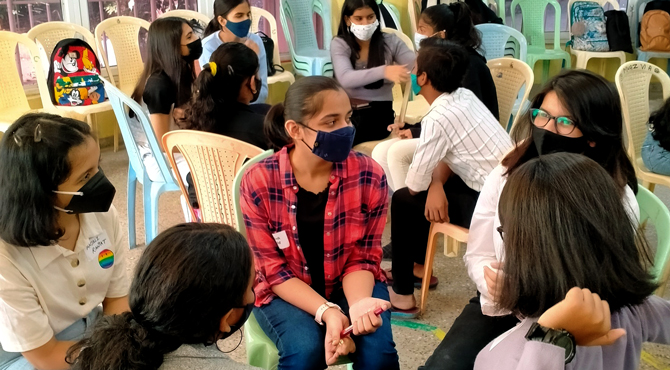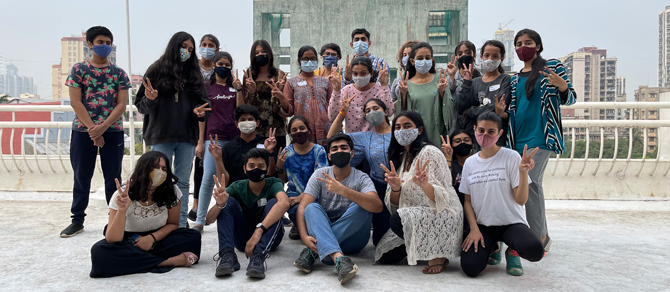Once a Seed makes up their mind, there are few things that can slow them down—not even Mumbai traffic.
When India’s COVID-19 restrictions finally lifted in November just enough to allow small in-person gatherings, youth did whatever it took to come together during a busy six weeks of programming for Seeds of Peace India.
In total, 68 students attended one or more of the various in-person and online programs offered for Indian youth in the final weeks of 2021. For some, this meant sitting hours in traffic each day, while also adhering to rigorous health protocols and balancing school and family obligations.
“The level of commitment made this group special,” said Sagar Gangurde, director India programs. “Despite having to travel for hours, adjusting to a horde of new people after two years in pandemic-induced isolation, and the physically demanding nature of the program, they all turned up every day and gave their best.”
Youth and adults were part of a burst of programs that wrapped up 2021 for Seeds of Peace-India. This included the first Indian Core Leadership Program, which launched in November with a series of multi-day workshops designed to give participants essential skills for leading change, including fundamentals of dialogue, humanistic leadership, and critical thinking around media messaging.
For youth like Mustafa, 14, the experience underscored the need to think critically about what they see and hear in media and from others around him.
“I learned how to embrace and understand the differences between people; about the privileges and biases we carry; and that it’s not about giving the correct answer, but about asking the correct question,” he said.
For adults, December brought the first Samvaad National Interfaith Summit, a daylong conference that brought together more than 70 educators, students, artists, religious and business leaders, and peer peace-building organizations to explore the importance of interfaith work and dialogue. The December 11 event also served as the culmination of the Samvaad Project, a nine-month program supported by the U.S. Consulate in Mumbai that offered interfaith dialogue facilitation training to university educators.
Though the program participants met the requirements to graduate many months ago, some have continued to hold community dialogue sessions for their students long beyond the course’s requirements—spreading the reach of Seeds of Peace along with the bridge-building capabilities of interfaith dialogue.
“’Interfaith’ can be a scary word for some people, and my hope is that these programs creates more awareness that interfiath isn’t just about religion, but what you value,“ Sagar said. “Samvaad and the summit showed the need for more openess toward exploring and understanding the benefits of diversity, and how these tools can be used in our lives.“
Later in December, the series of youth programs culminated with the Interfaith Harmony Camp, a signature program for Seeds of Peace India for nearly a decade. Over the course of five days, 29 students of various religions came together to explore different faiths through dialogue in a Camp-inspired environment.
They included youth like Anousha, 14, who said the experience showed the truth behind many of the misconceptions she had previously held around religions, and changed the way she engages in conflict.
“It made me realize that a lot of the time when I am in conflict with someone else, I am often at least partially at fault, if not for instigating the conflict, then for the way I choose to respond,” she said. “This prompted me to think more before I speak to others, as well as consider their viewpoints before making judgements about them.”



